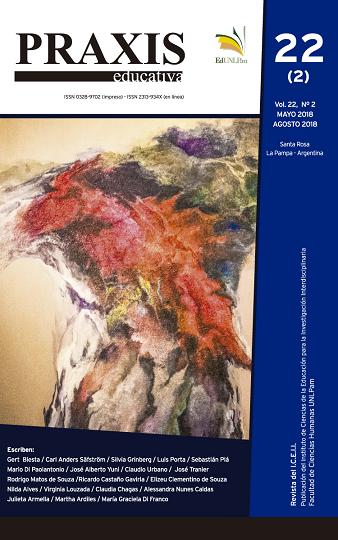About what is common. The school and the many. Five lines and one escape
DOI:
https://doi.org/10.19137/praxiseducativa-2018-220212Keywords:
school, community, encounter, self management, one/manyAbstract
In the present article –and as part of a dialogue on education, with regard to it and for it– we propose to think of the school in its spatio-temporal materiality as a place for meeting others in which the life in common is set. ‘Community’, in this sense, is understood not as a condition, not as an a priori, but as a possibility. ‘The school’ as its opportunity and as a line of flight. In a present marked by uncertainty and loneliness, we propose to think of the school as a space capable of going against the grain, as a spacetime in which dominant modes of relationship can be suspended to build new ones.
Downloads
References
Ball, S. (1990). Politics and policy making in education. Explorations in Policy Sociology. London: Routledge.
Barthes, R. (2003). Cómo vivir juntos. Simulaciones novelescas de algunos espacios cotidianos. Buenos Aires: Siglo XXI.
Biesta, G. y Säfström, C. (2011). “A manifiesto for education” in Policy Futures in Education Año V Nº9, 540-547
Butler, J. (2004) Precarious Life, London: Verso.
Deleuze, G. (1995). “Post-scriptum sobre las sociedades de control” en Ferrer, C. (comp.) El lenguaje libertario. Antología del pensamiento anarquista contemporáneo.
Buenos Aires: Altamira.
Deleuzem G. (2009). Cine I. Bergson y las imágenes. Buenos Aires: Cactus.
Deleuze, G. y Guattari, F. (1985). El Anti Edipo. Capitalismo y esquizofrenia.Barcelona: Paidós
Fernández Enguita, M. (2018).Más escuela y menos aulas. Madrid: Morata.
Ferrer, C (1996) Mal de Ojo. El drama de la mirada. Buenos Aires: Colihue
Foucault, M. (1976) Vigilar y castigar. Nacimiento de la prisión, Buenos Aires, Siglo XXI.
Foucault, M. (2007). Nacimiento de la biopolítica, Buenos Aires: Fondo de Cultura Económica
Grinberg, S. (2008).Educación y poder en el siglo XXI. Gubernamentalidad y Pedagogía en las sociedades de gerenciamiento. Buenos Aires: Miño y Dávila Editores.
Grinberg, S. y Abalsamo, M. (2017).“La escuela como espacio de lo común. Circulación y producción de la palabra en escuelas emplazadas en contextos de extrema pobreza urbana” disponible en http://biblioteca.clacso.edu.ar/clacso/becas/20160523100359/laescuelalocomun.pdf, consultado en 20/02/18
Grinberg, S. y Armella, J. (2018) “Gestión del self y Pedagogías uno a uno. Espacio-tiempo dislocados en la era del gerenciamiento” en Revista Em aberto. Brasilia (En prensa).
Grinberg, S. y Machado, M. (2017). ¿La escolaridad como líneas de fuga? Educación, jóvenes y futuro en contextos de extrema pobreza urbana en Espacios en blanco. Serie Indagaciones; Año V. Nº27, Tandil, 231 - 252
Lazzarato, M. (2006) Políticas del acontecimiento. Buenos Aires: Tinta Limón Ediciones.
López Petit, S. (2009). Breve tratado para atacar la realidad. Buenos Aires: Tinta Limón.
Popkewitz, T. Comp. (1994).Modelos de poder y regulación social en pedagogía, Crítica comparada de las reformas contemporáneas de la formación de las reformas contemporáneas de la formación del profesorado. Barcelona: Pomares-Corredor.
Rose, N. (1999). Powers of Freedom. Reframing political thought. Cambridge University Press: United Kingdom.
Rose, N (2006) The Politics of Life Itself: Biomedicine, Power, and Subjectivity in the Twenty-First Century.
Princeton, Princeton University Press.
Simons, M. y Masschelein, J. (2013)“Se nos hace creer que se trata de nuestra libertad: notas sobre la ironía del dispositivo de aprendizaje”. Pedagogía y Saberes Año II N° 38. Universidad Pedagógica Nacional. Facultad de Educación. Colombia, 93-102.
Simons, M. y Masschelein, J(2014). Defensa de la escuela. Una cuestión pública. Buenos Aires: Miño y Dávila.
Spinoza, B. (1984). Ética. Madrid: Editora Nacional.
Tatián, D. (2015). La cautela del salvaje. Pasiones y política en Spinoza. Buenos Aires: Colihue.
Trombadori, Duccio. (2010) Conversaciones con Foucault, Pensamientos, obras,
misiones del último maître-penser. Buenos Aires: Amorrortu.
Downloads
Published
Issue
Section
License
Copyright Notice
Editorial Committee Educational Praxis Magazine:
I hereby declare that I am the author of the article titled (article name), that it is original and my own and that it was not previously published in any other format or medium. I declare to know that the magazine will not charge me any type of fee under any circumstances, nor will I receive any type of monetary compensation If it were accepted for publication in Educational Praxis, I authorize the aforementioned magazine to publish it digitally and to advertise it on its social networks.
If the work is published, I adhere to the Creative Commons license called "Attribution - Non-Commercial Share Alike CC BY-NC-SA", through which it is allowed to copy, reproduce, distribute, publicly communicate the work and generate derivative works, as long as when the original author is cited and acknowledged. This license has been used since September 2018. In 2016 CC BY NC ND 4.0 was adhered to; and in the years 2017 and 2018 (January-August) CC BY NC 4.0.
This CC BY-NC-SA Share Alike license does not, however, permit commercial use of the work. As an author, the journal may establish additional agreements for the non-exclusive distribution of the version of the work published in the journal, it allows me to self-archive the published articles, in their post-print version, in institutional, thematic repositories, personal web pages or any other relevant use. with the recognition of having been first published in this journal.
Educational Praxis adheres to DORA (Declaration on Research Assessment) signed in San Francisco, California, on December 16, 2012, and to the Declaration of Mexico (Joint Declaration LATINDEX - REDALYC - CLACSO - IBICT).















_(1)2.png)


3.png)











_(2).png)






2.jpg)









